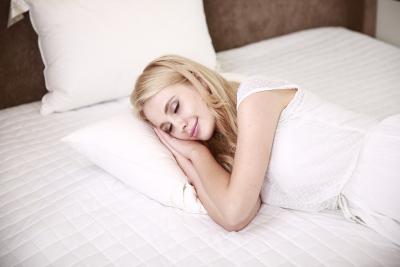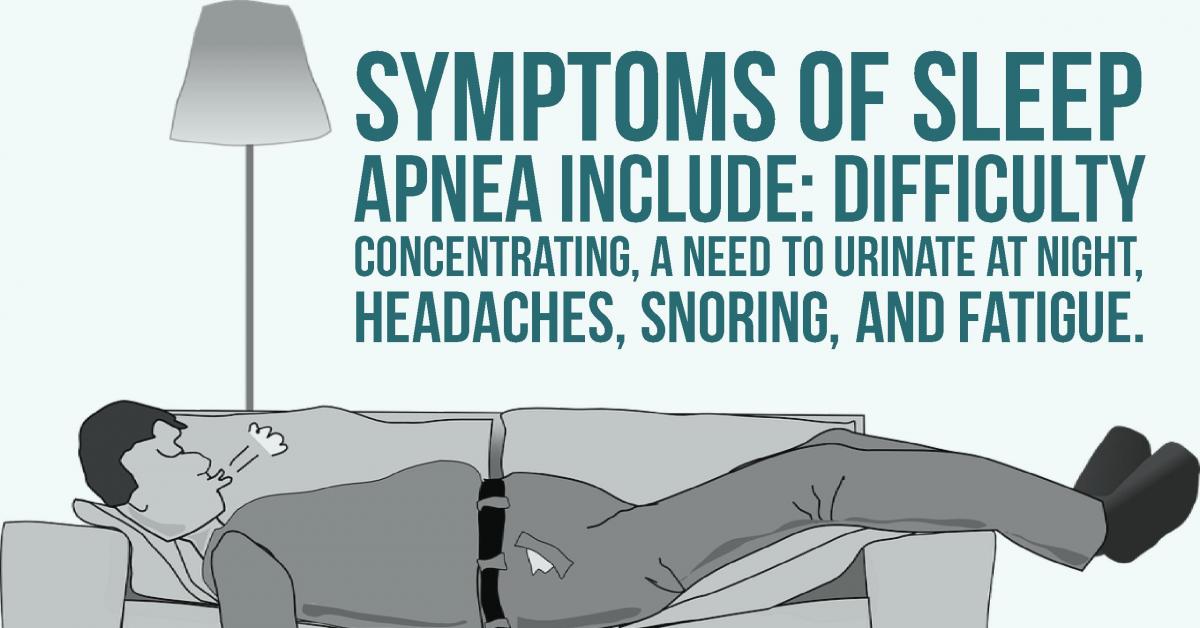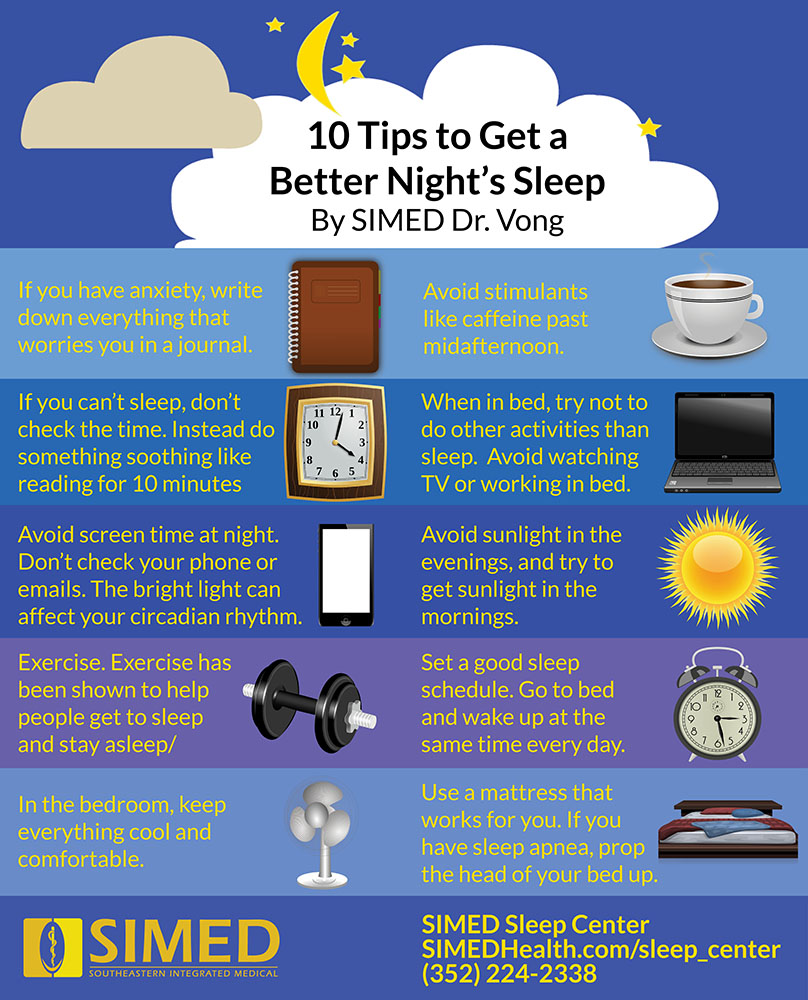
November is National Sleep Comfort Month, and sleep comfort has become more important than ever as many people today struggle with sleep related issues.
But how can you get a more restful sleep or recognize the signs of a sleep problem? We talked with SIMED Neurology and Sleep Center Dr. Kraiyuth Vongxaiburana (Vong) to find out everything you need to know to get a better night’s sleep!
How to Recognize if You Have a Sleeping Problem
A common symptom of most sleeping problem is waking up and not feeling refreshed or feeling tired. If you feel tired, something might have gone amiss while you slept. Not sleeping well could mean you have insomnia or other issues like sleep apnea.
Another indicator is if you have trouble falling asleep or wake up in the middle of the night and can’t get back to sleep. Sometimes, people might wake up often to use the restroom and think they have a urinary problem, but they really have sleep apnea. Snoring also might indicate that you have sleep apnea.
What is Sleep Apnea?
Sleep apnea is very common. More than 18 million people in the United States have sleep apnea.
If you wake up and feel tired, if you snore loudly, or if your partner notices that you stop breathing at night or snore very loudly, you could have sleep apnea. Overweight people are more likely to have sleep apnea because when you’re overweight, your airway can relax and close, obstructing your breathing. The obstruction can cause you to snore loudly and stop breathing or not get a full breath of air.
When you have sleep apnea, your oxygen levels drop and you can wake up for short periods during the night without realizing. Waking up from sleep apnea can leave you unrefreshed in the morning and make your sleep fragmented. Even when you do get sleep, you might still feel lousy and like you haven’t slept. You can have trouble getting out of bed.
How Do You Diagnose and Treat Sleep Apnea?
You can participate in an overnight sleep study to find out if you have sleep apnea. SIMED performs overnight sleep studies which allow physicians to monitor your sleep patterns and determine your problem.
If you were diagnosed with sleep apnea, you might be prescribed a breathing machine called a CPAP. CPAPs have a mask that goes over your face and blows continuous air pressure into your airway to keep it open for more oxygen. Using a CPAP generally leads to decreased arousal, and people with sleep apnea feel more refreshed.
Why Should You Get Treated for Sleep Apnea?
Feeling more awake in the morning isn’t the only reason you should get treated. If left untreated, sleep apnea can lead to increased risk of high blood pressure, stroke, heart attack, and cardiac arrhythmias. Waking up throughout the night ramps up adrenaline and increases risk of many dangerous medical problems. It can even cause insomnia.
What is Insomnia?
Insomnia is another very common problem. About 30 to 40% of people have insomnia, and women tend to be more affected than men. Insomnia is when people have difficulty falling asleep or staying asleep.
People can have insomnia due to many different reasons. They might be uncomfortable or anxious and unable to sleep. Their circadian or sleep rhythm might be off. Patients might also have psychophysiological insomnia, meaning they are anxious about getting to sleep so they worry about sleeping and stare at the clock which makes sleeping even more difficult and creates a cycle where they’re more and more anxious and have increased difficulty sleeping. Breaking the cycle can be difficult, but working on good sleep hygiene can help.
10 Ways to Get a Better Night’s Sleep
If you have insomnia or trouble falling asleep, here are 10 tips for improving your sleep comfort.
1. If you have anxiety, write down everything that worries you. You don’t need to write everything down right before bedtime, but if you make a list a few hours earlier, you can get your worries out of your mind and into a journal.
2. Avoid stimulants like caffeine too close to bedtime. Don’t drink coffee or other caffeinated drinks past midafternoon.
3. Don’t constantly check the time. If you don’t fall asleep or have trouble falling asleep, after 30 minutes of trying, don’t stare at the clock. Instead, get up and do something calming for 10 minutes. For example, you could drink a glass of milk or read a book. Then try to go back to bed.
4. When in bed, try not to do other activities than sleep. If you’re working in bed or watching TV in bed, you train your mind to do other things than sleep in bed which can lead to your brain being more active at bed time.

5. With smartphones, avoid screen time. You can easily answer your phone or check emails at night, but when you do, you train your mind to do other things at night besides sleeping and can end up resetting your sleep clock. The bright light can reset your circadian rhythm and make getting to sleep more difficult.
6. Avoid sunlight in the evenings. Especially in the summertime, try to get bright sunlight in the morning instead of the evening because it will make you feel more awake.
7. Exercise. Exercise in general has been shown to help people get to sleep and stay asleep. Some people find that exercising before bedtime can make sleeping more difficult, so exercise earlier in the day or whenever works best for you.
8. Set a good sleep schedule. Go to sleep at the same time every night and wake up at the same time every day. You should get 7 to 8 hours of sleep, and some people may even need 9 hours of sleep. Try not to take naps during the day to avoid throwing off your schedule. Create a good bedtime routine (like you might for your children) that includes turning off the TV, dimming the lights, and avoiding stimulation a couple of hours before bedtime. Some people might even take a warm bath.
9. In the bedroom, keep everything cool and comfortable. Keep the room as dark as possible, and keep noise to the minimum.
10. Use a mattress that works for you. Some people like more firm mattresses, and some people prefer softer mattresses. Experiment to find what works for you, and if you have sleep apnea, elevating the front of your bed can help because gravity won’t be working as much against you. If someone is sleeping flat, their airway can close. Sleeping on your side or elevating your bed can help open it. You can get a wedge to put under your mattress or get a mattress that elevates the head.
What about Sleep Aid Medications? Are They More Harmful or Helpful?
Over-the-Counter Medications
It’s okay to use sleep medications once in a while. A lot of over-the-counter antihistamines can help people get to sleep and feel better in the morning, but some can end up blocking acetylcholine which can affect memory. Older people should try to avoid antihistamine sleep medications and instead try medications containing melatonin. While some people can get addicted to sleep medications like Benadryl, most people won’t be addicted to over-the-counter medications.
Prescription Medications
Try to avoid prescription medications, specifically the addictive ones like ambien and restoril. For some, they are needed, but for others, the medication can work for a while, but when people get used to it, they build up a tolerance. Non-addictive medications like trazodone should be tried first to help with sleep before something with more potential tolerance for addiction.
Alternatives
If you use sleep aids, you can also practice good sleep hygiene and try out cognitive behavioral therapy with a therapist or psychologist. We can have difficulty sleeping because we’re anxious and set up a cycle where we worry about things which can make it more difficult to sleep. A psychologist would help tease out abnormal thoughts
Also, a psychologist could help people in a cycle of bad sleep realize getting a bad night’s sleep would not be the worst thing in the world. Those people might not worry so much about it and get a better night’s sleep.
If you have trouble sleeping, talk to your doctor about getting a sleep study done or contact SIMED’s sleep center at 352-224-2338. To schedule an appointment with Dr. Vong or another SIMED neurologist, call 352-374-2222 or request an appointment online.